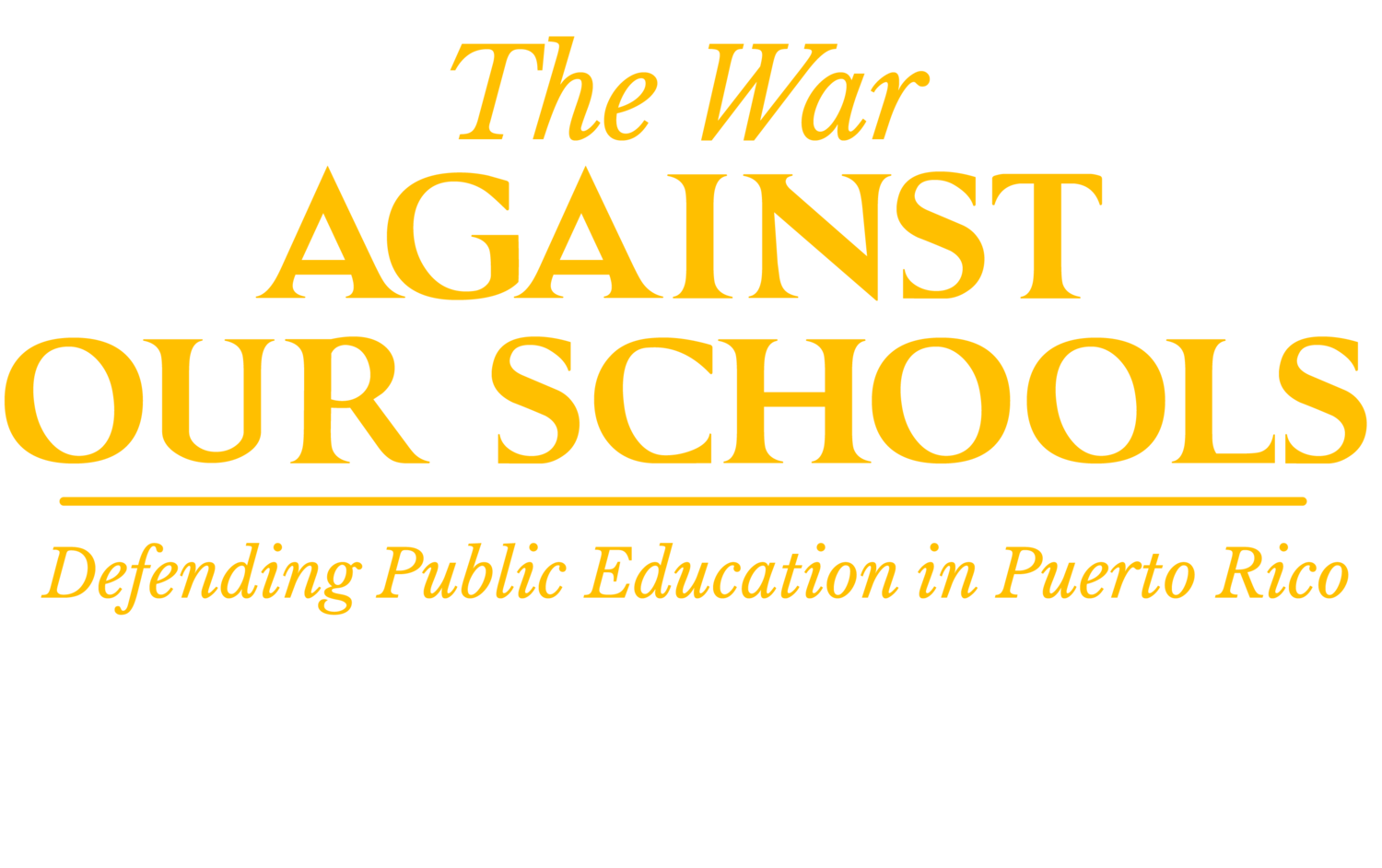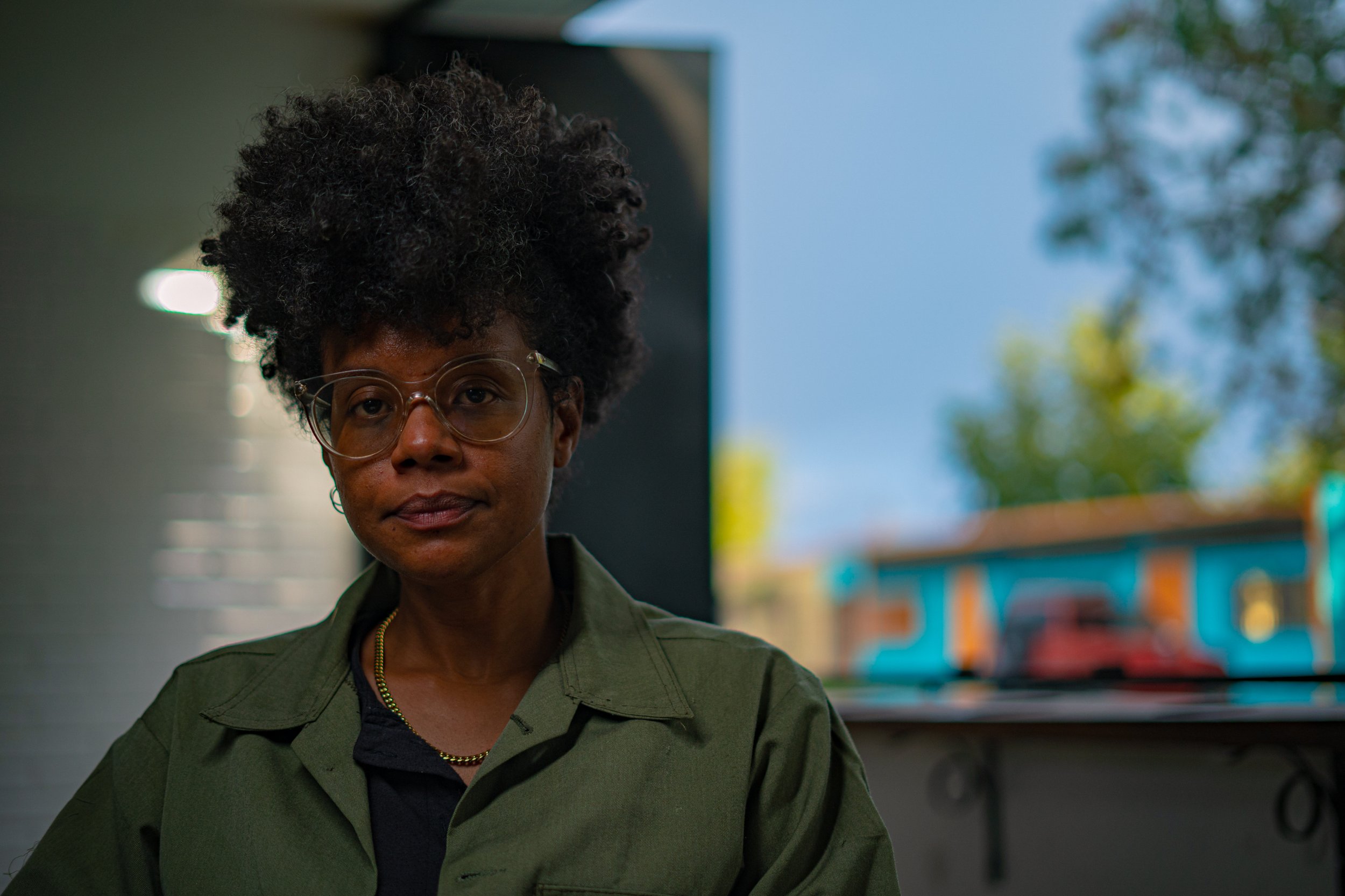
Viewing Guide and Syllabus
Education Privatization and School Rescues in Puerto Rico: A Microsyllabus for War Against Our Schools (2021)
As part of a collaboration between the Puerto Rico Syllabus and Defend Puerto Rico, this Microsyllabus accompanies the documentary film, War Against Our Schools (2021) and provides viewers with several entry points to further explore and historicize the film’s central themes.
Public education in Puerto Rico has been a key target of austerity governance over the past two decades, often legitimized through narratives of “school choice” and “consolidation.” The most recent waves of school closures coincided with the passage of an education reform bill just months after Hurricane Maria, which facilitated public to private transfers through vouchers and charter schools. As War Against Our Schools demonstrates, school closures do more than empty buildings and relocate students. Rather, school closures tear apart the social fabric and disrupt the lives of families, communities, and teachers. Additionally, the communities most affected by school closures are those that have historically experienced deep state disinvestment as a result of race, class, and/or residential marginalization. School closures make already vulnerable communities even more so, while sowing the seeds for greater precarity in the future.
Drawing on a long history of rescates in Puerto Rico, impacted communities have taken up school rescues to contest these processes and build alternatives through mutual aid. Education privatization and resistance efforts are not unique to Puerto Rico, but resonate with larger patterns of racial capitalism, displacement, and dispossession throughout the United States in places such as New Orleans, Chicago, and Detroit. We offer this microsyllabus and larger viewing guide in the hopes that the powerful examples of community control and empowerment highlighted in War Against Our Schools can inspire transformation and forge networks of solidarity necessary to defend public education.
Micro-Syllabus
-
Deepak Lamba-Nieves, Sergio M. Marxuach, and Rosanna Torres, “PROMESA: A Failed Colonial Experiment?” CNE, June 29, 2021
Center for Popular Democracy and ACRE, “PROMESA Has Failed: How a Colonial Board Is Enriching Wall Street and Hurting Puerto Ricans,” September 14, 2021.
Ed Morales, “The Technocratic Takeover,” Jacobin, September 13, 2016
VIDEO: The People’s Forum NYC, “Se Acabaron Las Promesas: The Movement for Puerto Rico’s Independence,” YouTube.
-
Jennifer Hinojosa, Edwin Meléndez, and Kathya Severino Pietri, “Population Decline and School Closures in Puerto Rico,” The Center for Puerto Rican Studies, 2019.
Dalia Rubiano Yedidia,, Eli Moore, EJ Toppin, Ake Ake, Luis Gallardo Rivera, Marina Moscoso Arabía, and Grace Fontánez Valle,. “Puerto Rico’s Public School Closures; Community Effects and Future Paths,” Othering & Belonging Institute and Centro para la Reconstrucción del Hábitat, 2020.
Frances Robles, “Puerto Rico’s Debt Crisis Claims Another Casualty: Its Schools,” New York Times, May 10, 2017.
-
Rima Brusi, “No Savings, Just Pain: School Closures and ‘Reform’ in Puerto Rico,” Alternautas, 2020.
Aída Chávez and Rachel M. Cohen, “Puerto Ricans Fear Schools Will Be Privatized in the Wake of Hurricane Maria,” The Intercept, November 8, 2017.
Kate Aronoff, “A Hurricane in the Classroom: Inside the Schools Ensnared in Puerto Rico’s Privatization Fever — and How Its Teachers Are Fighting Back” Rethinking Schools, July 23, 2018.
Monique Dols, “Puerto Rico’s Privatizers Are Finally Getting What They Deserve,” Jacobin, July 16, 2019.
-
Kevin Lawrence Henry, Jr., “‘The Price of Disaster’: The Charter School Authorization Process in Post-Katrina New Orleans,” Educational Policy 35 (2): 235–58, 2021.
Kristen L. Buras, “‘We're not going nowhere’: race, urban space, and the struggle for King Elementary School in New Orleans,” Critical Studies in Education, 54:1, 19-32, 2013.
“Lessons from New Orleans: Peter Brogan Interviews Kristen Buras,” Against the Current, 2017.
PODCAST: “Lessons from our Country’s Largest School Closing w/ Eve L Ewing (Ep. 20),” Big Brains, March 4, 2019.
Allie Gross, “School Choice Gutted Detroit’s Public Schools. The Rest of the Country is Next,” Vice, December 19, 2016.
Mark Binelli, “Michigan Gambled on Charter Schools. Its Children Lost,” New York Times, September 10, 2017.
-
Dean Spade, Ayuda Mutua: Construyendo solidaridad durante esta crisis (y la próxima), Verso, 2020.
Giovanni Roberto, “Sin Perdón y Sin Permiso.” 80 Grados, December 1, 2017.
Isa Rodríguez Soto, “Mutual Aid and Survival as Resistance in Puerto Rico,” NACLA Report on the Americas 52 (3): 303–8., 2020.
MAP: Jacqueline Villarubia Mendoza and Roberto Vélez-Vélez, “Visualizando el Apoyo Mutuo,” 2020.
Jacqueline Villarrubia-Mendoza and Roberto Vélez-Vélez,. “Centros de Apoyo Mutuo: Reconfigurando La Asistencia En Tiempos de Desastre” Centro Journal xxxii (iii), 2020.
-
Liliana Cotto Morales, Liliana,. Desalambrar: Orígenes de Los Rescates de Terreno En Puerto Rico y Su Pertinencia En Los Movimientos Sociales Contempóraneos, Editorial Tal Cual, 2011.
DOCUMENTARY FILM TRAILER: Desalambrando, 2019.
Érika Fontánez Torres, “Frente al Vacío, a Rescatar El Futuro.” 80 Grados. September 13, 2017.
Natasha Khan, “Dominican Immigrants Fight for Land Rights in Puerto Rico,” Puerto Rico Unsettled Territory, October 29, 2012.
“Invasiones de terrenos son comunes en Puerto Rico,” Primera Hora, August 7, 2009.
-
Denis Márquez, “Rescates de solidaridad.” Metro, September 13, 2019.
Paola Torres, “Al rescate del olvido,” Tinta Digital, December 4, 2019.
Yaritza Rivera Clemente, “Reabren escuelas para el servicio de la comunidad,” El Vocero, November 3, 2019.
Keila López Alicea, “Al rescare de la escuela,” El Nuevo Día, June 16, 2018.
FACEBOOK LIVE DIALOGUE: Colectivo Ilé, “Junte de Saber Antiracista: PATBA,” July 28, 2020.
-
PROMESA Law, 2016.
Teaching Tools
reference for question #1
Questions for self reflection:
The student-activist Claudia Santos Suárez explains the privatization of schools in the following way: "privatization turns rights into privileges.". Consider your own experiences related to education and whether you, your communities, your family, and your contexts tend to see education as a right or as a luxury.
In what ways have you witnessed racial inequality when it comes to access to education? How have you seen racial inequality connected to the division between public and private education?
Reflect on your own educational and communal experiences. We typically think of schools as providing education and other spaces as providing community. How did your school foster a sense of community? What other organizations/spaces fed your knowledge?
Questions about the film:
In War Against Our Schools, we learn of 500+ school closures in Puerto Rico, many of which were primary and elementary schools. These young children were forced to leave their local schools to attend others that were further from their homes. Based on the film, imagine and comment on how these children's lives and their families have been impacted.
A school closure represents the loss of a service and a right. Yet, so much more is also lost. What do school closures mean for a community's identity, sense of belonging, and future?
As the film describes, Puerto Ricans have a long history of defending public education and they constantly confront what Mercedes Martinez describes as "a political system that doesn't care about education." Why was post-hurricane María the moment that the government began implementing a privatization agenda that included charter schools?
reference for question #4
4. Ashana Bigard explains that
"one of the best things that came out of Hurricane Katrina is that "if you were confused, it let you know real quick—you’re a third class citizen in this country".
mapenzi chibale nonó, speaking about Carolina, Puerto Rico, comments on how her community has responded to the government's multilayered abandonment: "our community has shown an incredible resilience to face the process of systemic racism.". How does this film demonstrate the intersection between disaster capitalism and structural racism, both in Puerto Rico and New Orleans?
5. War Against Our Schools highlights 3 different organizations and groups that rescue schools: CAM Las Carolinas, La Conde, and MARES. What motivates people from the community to come together to reclaim these spaces? How do these rescued schools provide material, social, and spiritual needs to the community?
6. How did MARES and their rescue of Escuela Lorencita Ramírez de Arellano exemplify a democratic process?
7. mapenzi chibale nonó states that La Conde
“seeks to promote an education relevant to the community, with the values and needs of the community, taking into account that the needs of the Black community are particular.”
How does La Conde's philosophy challenge or revise normative teaching methods as well as the traditional content taught in schools?
8. Enclosure, the process of taking lands, spaces, and public goods that are shared by a community and privatizing them for the use of only a few, is a crucial part of colonialism. What do efforts to re-open schools mean in a context and history of colonial enclosure? How do these efforts create a different understanding of land and ownership?
reference for question #6
reference for question #7
9. A crucial part of capitalism is the creation of scarcity; that is, the idea that there are not enough resources for everyone and that those who have them worked hard for them and/or deserve them. In the context of colonial debt and austerity, how do these communities create abundance?

10. In the film, Jesús Lasanta reflects on what the empowerment and autosuficiencia of school rescues mean in a colonial context. He states:
"We made this possible without the help of the government, without FEMA, without the capitalists. In fact, without open doors, we have had to live independently."
"You don't have to be independent to be free."
What kinds of ideas about sovereignty do these statements reflect?
11. Miguel Rosario states that critical thinking is necessary,
"not only to question ourselves, but also, to question the decisions of the government."
How do the organizations and groups depicted in the film expand the definition of "education?" What does education encompass? How does it take place? How does it empower? How does it feel?
12. How does War Against Our Schools--as a film, a documentary, a story-telling device-- expand a sense of how education and learning can take place?
13. Did these stories inspire you in any way? For instance, did they activate you to form part of an organization, empower you to take over public space, make you question educational practices and policies, make you interested in learning more about disaster capitalism, foster a defense of public education? If you identify with one of these, what moment or aspect of the story or quality of the storyteller inspired you?

ACTIVITY
As a group, agree upon the boundaries of the region or community that you're all inhabiting. After these boundaries are determined, co-create a mental map of this location's infrastructural landscape. Are there abandoned spaces or buildings in your community? How are these spaces inhabited or viewed by community members? If it's helpful, draw out a map on a whiteboard, signaling the abandoned spaces that come up during the discussion. Take turns imagining different ways and purposes to rescue these spaces. If it's pertinent, consider their particular geographical location within the community. What communities would they serve? What needs or absences would they fill?







